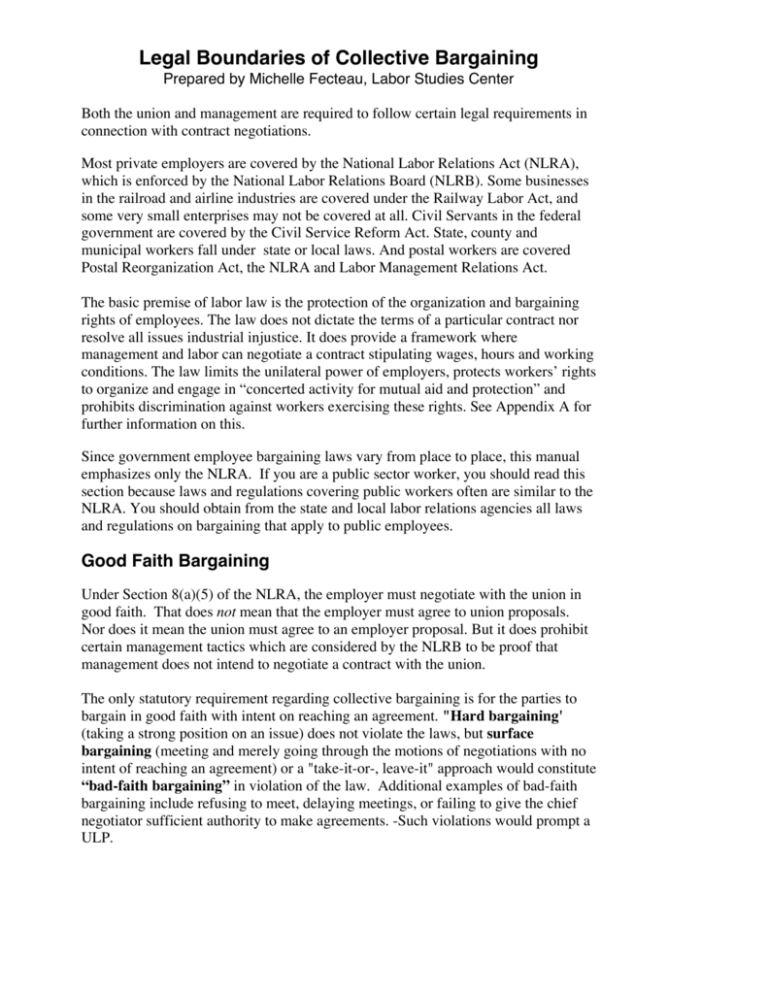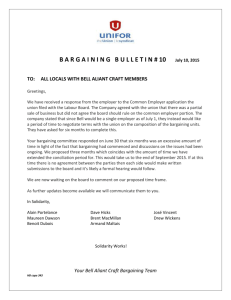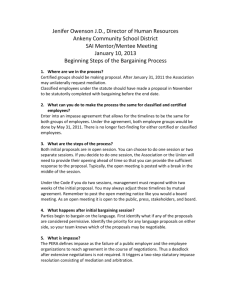Legal Boundaries of Collective Bargaining
advertisement

Legal Boundaries of Collective Bargaining Prepared by Michelle Fecteau, Labor Studies Center Both the union and management are required to follow certain legal requirements in connection with contract negotiations. Most private employers are covered by the National Labor Relations Act (NLRA), which is enforced by the National Labor Relations Board (NLRB). Some businesses in the railroad and airline industries are covered under the Railway Labor Act, and some very small enterprises may not be covered at all. Civil Servants in the federal government are covered by the Civil Service Reform Act. State, county and municipal workers fall under state or local laws. And postal workers are covered Postal Reorganization Act, the NLRA and Labor Management Relations Act. The basic premise of labor law is the protection of the organization and bargaining rights of employees. The law does not dictate the terms of a particular contract nor resolve all issues industrial injustice. It does provide a framework where management and labor can negotiate a contract stipulating wages, hours and working conditions. The law limits the unilateral power of employers, protects workers’ rights to organize and engage in “concerted activity for mutual aid and protection” and prohibits discrimination against workers exercising these rights. See Appendix A for further information on this. Since government employee bargaining laws vary from place to place, this manual emphasizes only the NLRA. If you are a public sector worker, you should read this section because laws and regulations covering public workers often are similar to the NLRA. You should obtain from the state and local labor relations agencies all laws and regulations on bargaining that apply to public employees. Good Faith Bargaining Under Section 8(a)(5) of the NLRA, the employer must negotiate with the union in good faith. That does not mean that the employer must agree to union proposals. Nor does it mean the union must agree to an employer proposal. But it does prohibit certain management tactics which are considered by the NLRB to be proof that management does not intend to negotiate a contract with the union. The only statutory requirement regarding collective bargaining is for the parties to bargain in good faith with intent on reaching an agreement. "Hard bargaining' (taking a strong position on an issue) does not violate the laws, but surface bargaining (meeting and merely going through the motions of negotiations with no intent of reaching an agreement) or a "take-it-or-, leave-it" approach would constitute “bad-faith bargaining” in violation of the law. Additional examples of bad-faith bargaining include refusing to meet, delaying meetings, or failing to give the chief negotiator sufficient authority to make agreements. -Such violations would prompt a ULP. Subjects of Bargaining Nothing in the law requires either party to make a concession or to reach an agreement. The law does, however, require that the parties bargain in good faith in an attempt to reach an agreement. In order to expedite this process the NLRB has, over the years, defined certain things that the parties must do to move towards the “good faith” bargaining goal. One thing has been to decide what is, or is not, proper subjects for the parties to bargaining over. The three categories of bargaining are mandatory, permissive, and illegal subjects of bargaining. Mandatory Subjects Mandatory subjects of bargaining are issues of wages, hours and working conditions. The following are examples of mandatory subjects of bargaining: • arbitration • bargaining unit work • bereavement leave • bonuses • clothing and tool allowances • cost-of-living adjustments (COLA) • dental and vision plans • discharge and discipline • discounts on company products • dues check-off clauses • equity pay adjustments • grievance procedures • holiday pay • hours of work • incentive pay • jury duty pay • layoffs and recalls • legal services plans • life insurance • management's rights clauses • medical insurance • overtime premiums • pay for time spent on union business • pay for training • pension for current employees • premium pay for Sundays & holidays • profit-sharing • promotions • red-circle pay • rest and lunch periods • salaries • shop or plant rules • sickness and accident plans • testing of employees • transfers • tuition reimbursement • union shop or other union security clauses (unless state law prohibits) • vacation pay • wages • workloads • work schedules The parties have a statutory duty (obligation) to bargain over mandatory subjects of bargaining at the request of either party. Mandatory subjects of bargaining may be bargained to impasse. Permissive Subjects Permissive subjects of bargaining may be voluntarily discussed but can not be bargained to impasse. Nor will a ULP be upheld if either party refuses to bargain a permissive subject; or initially bargains and subsequently refuses to continue discussion on a permissive subject; or retracts an agreement on a permissive subject at any time prior to the signing of the agreement. Permissive subjects of bargaining fall outside of wages, hours and working conditions typically controlled by the employer. They include: • ground rule negotiations • internal union matters such as how and when a tentative agreement is ratified • the price of meals furnished or sold to employees by an independent caterer • granting the employer the right to use the union label • demanding that a union settle all grievances that are arbitrable that arose under the previous contract • settlement of unfair labor practice charges • pension benefits for retired members Illegal Subjects Any proposal which violates National Labor Relations Act (NLRA), the Public Employees Relations Act (PERA), the Civil Service Reform Act (CSRA) and/or any other federal, state, county or municipal law would be an illegal subject of bargaining. All illegal agreements/provisions are void and unenforceable. Illegal subjects of bargaining would include: • closed shop provisions, (requires an employee be a union member in order to be hired for a job), • provisions that discriminate against employees because of race, creed, sex, etc., • hot cargo clauses, (language that prohibits an employer from dealing with any other employer, typically those involved in a labor dispute) The Status of the Contract during Negotiations Status Quo During negotiations management must maintain the status quo [keep things the way they are] when it comes to existing wages, hours, and working conditions. This is true even if a contract has expired. The exception to maintaining the status quo occurs when an “impasse” in negotiations has been reached. An impasse means that negotiations have reached the point where neither party is willing to make additional compromises on an issue in order to reach an agreement. The employer may then unilaterally impose its last offer at the negotiating table on the issues for which a legal impasse has been reached. (See "Avoiding Impasse" in Section III, page 37.) At any time after a contract expires, the union can strike or the employer can lock out workers. Examples of 8(a)(5) Unfair Labor Practices Refusing to supply information requested by the union in order to bargain intelligently. Refusing to meet at reasonable times with union negotiators, or attempting to dictate who those union negotiators may be or how large a team the union can use. Refusing to abide by ground rules for negotiations agreed to by both sides. Attempting to bargain directly with the membership instead of with the union's official negotiators. Attempting to discourage membership support for the union negotiators by using threats, promises, punishment, or discrimination. Withdrawing approval of particular parts of the contract on which the two sides had already reached tentative agreement. Refusing to negotiate over a mandatory subject of bargaining or insisting to negotiate a permissive subject to impasse. Unilaterally changing wages, hours, or working conditions before reaching impasse in bargaining (unless you have waived this right in the contract). Engaging in surface bargaining by going through the motions of negotiating but taking positions which clearly could never be the basis of give-and-take bargaining.






![Labor Management Relations [Opens in New Window]](http://s3.studylib.net/store/data/006750373_1-d299a6861c58d67d0e98709a44e4f857-300x300.png)